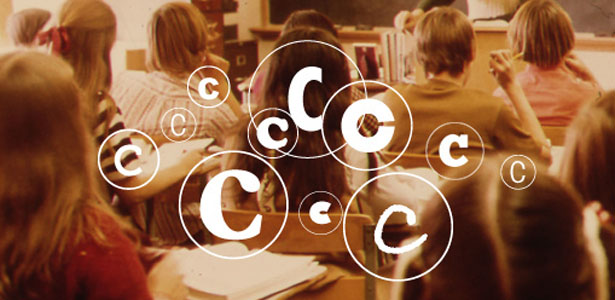Should Copyright Be Allowed to Override Speech Rights?
Congress's latest Internet copyright legislation, if passed, would dangerously limit both user privacy and social networking sites' ability to create open forums for free speech.

Free speech has remained a quintessential American ideal, even as our society has moved from the ink quill to the touch screen. But as the Internet paves new avenues for speech, Congress seems to be remembering only some of the lessons of our tradition. While lawmakers continues to understand the potential threat from defamation laws, proposed legislation on copyrights shows that many in Congress are willing to overlook threats to free speech similar to those that overzealous defamation laws undoubtedly create.
Defamation law, while necessary to protect wrongly tarnished reputations, raises well-known threats to freedom of speech. If you criticize a large company, powerful businessman, or public official, you can expect a well-paid lawyer to at least consider bringing a defamation lawsuit. These suits chill protected speech and discourage robust debate. Because of this threat, the Supreme Court has imposed free-speech limitations on defamation suits, most famously in the celebrated 1964 decision New York Times v. Sullivan.
Our nation has also long understood that copyright law, while adopted to promote creative arts, similarly raises potential threats to freedom of speech. For example, if you use someone else's words against them while criticizing a book or corporate actions, you could expect a copyright suit intended to suppress your criticism. The Supreme Court has crafted doctrines such as "fair use," which permits copying materials for criticism, parody, and transformative uses, and has ruled that abstract ideas are not subject to copyright, because courts will not punish people for merely using an abstract concept in speech.
In the 1990s, Congress heeded both these lessons and adopted laws translating these long-standing constitutional concerns to the Internet. Knowing that defamation or copyright suits could cripple the emerging speech platforms, legislators provided immunities -- or safe harbors -- for sites following specific procedures. Congress created a safe harbor for defamation in 1996 and for copyright in 1998. Both safe harbors were designed to ensure that the Internet would remain a participatory medium of speech. After all, if AOL were responsible for every defamatory comment responding to chat-room chatter or news clips, or for every copyright infringement on its instant messaging system, it would either have had to shut down or to assert control over all the speech on its platforms.
Other companies would have faced the same choice, and many sites that have launched since then, such as Blogger and Facebook, might have lacked the legal protections to launch. These safe harbors, in their way, helped preserve the Internet's potential for participatory, many-to-many communications unimaginable in the pre-1990s era dominated by one-to-many television and newspapers.
But since then, Congress has become inconsistent in its sensitivity to free speech threats. Lawmakers deserve credit for continuing to guard against defamation's burden. In 2010, Congress passed the SPEECH Act, forbidding American courts from enforcing certain foreign defamation judgments. Plaintiffs had been bringing defamation claims against Americans in countries halfway around the world where plaintiffs were more likely to prevail and where free-speech considerations did not limit defamation cases. This "defamation tourism" could stifle robust American debate online. In the words of bill supporter Sen. Patrick Leahy, a longtime civil liberties advocate, the "chilling" potential of these defamation actions threatened the "freedoms of speech and the press" that are "cornerstones of our democracy."
Today, however, Congress is considering passing major legislation to change the definitions of online infringement. While supposedly aimed at foreign "rogue sites" like the Pirate Bay in Sweden, the legislation's new definitions would alter the copyright safe-harbor and make platforms for user-generated speech -- including Twitter, Facebook, and YouTube -- liable for copyright infringement committed by users. These sites would have to adopt Big Brother technologies to monitor all their users' activities in order to make sure no user is sharing the latest release from the Twilight series.
Making matters worse, the mechanisms for enforcement include cutting off all access to funding, removing sites from search engines, and blocking website addresses in technical ways that threaten the Internet's security and universality. All of this is done in the name of reducing copyright infringement online. Because of the threat to online speech platforms, companies like Tumblr and civil liberties groups like the Electronic Frontier Foundation and Fight for the Future coordinated an "American Censorship Day" in November in protest. Even the European Parliament has launched criticism rooted in speech concerns across the Atlantic Ocean.
Contrast this with defamation. Imagine if our nation, or another, had proposed legislation to punish any website for defamation committed by its users. Imagine also that enforcement against such sites -- defined as "dedicated to defamation" -- would include automatically cutting off advertising and credit-card processing, removing sites from search engines, and messing with the global Internet addressing system to shut them down.
We would all recognize such a law would lie on the wrong side of free speech. But Leahy, who was a champion of the SPEECH Act, sponsored the Senate copyright bill that would adopt these procedures. Many members of the House supported speech protections for defamation through that Act but fail to support similar protections when a law addresses copyright -- even though the proposed laws would miss their mark and silence a lot of non-infringing speech.
Congress should have learned its lesson: the 1998 copyright safe harbor recognizes the lessons of the First Amendment. So does the SPEECH Act. Why can't copyright legislation today?
Image credit: Flickr